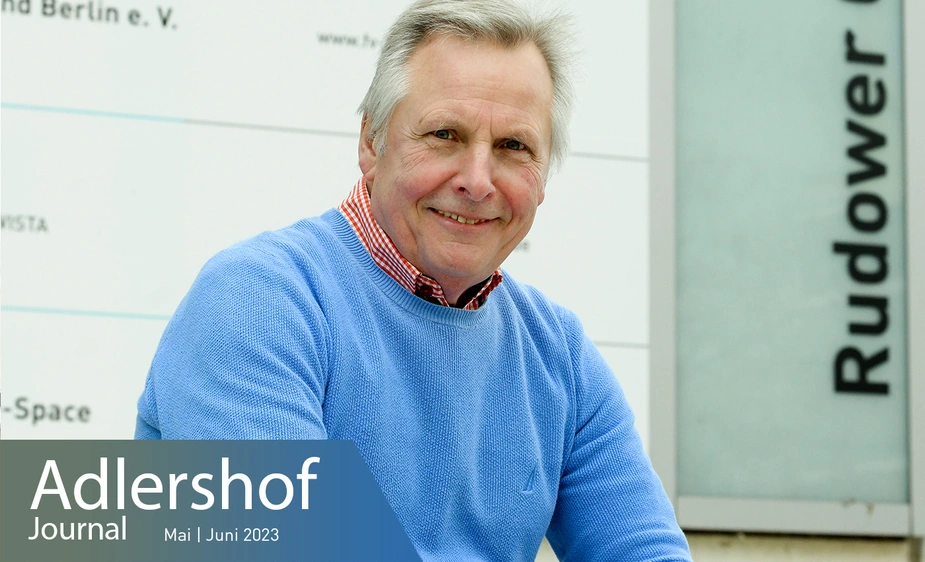A veteran of Adlershof
Biophysicist Helge Neumann says goodbye – the long-standing head of the WISTA International Office has carried the Adlershof model out into the world
There are countless issues that Helge Neumann has addressed during his time in Adlershof. The biophysicist has been part of WISTA now for over 30 years. As different as his projects were, they were all characterised by a spirit of creativity and openness – and by internationality. “We always sought to share the knowledge of how to establish a site that facilitates collaboration between research and industry,” says the long-standing head of Adlershof’s International Office, citing France and other European countries as past cooperation partners. Until the mid-2010s, the work with Moscow also went well and, more recently, projects with Poland, Ukraine, Armenia, and Thailand, often in cooperation with Humboldt-Universität (HU).
Neumann, who was a member of the research staff at the former East German Academy of the Sciences until 1990, likes to recall the times after the Fall of the Wall when the future of Adlershof was still a battleground. “We succeeded in restructuring the strength of this location, the concentration of scientific and technological work.” The concept of the Adlershof Development Company and then WISTA gave way to an internationally renowned Science and Technology Park. International cooperation flourished. There was a German-French, then a German-Russian, and, finally, an International Office. They all provided Adlershof-based institutes and companies with effective support to create international networks.
From many examples, Neumann highlights the cooperation with the technology park in Tucson, Arizona, which was exceptionally close for a long while and included the “Photonics West” trade fair. With the International Association of Science Parks, too, a stimulating exchange of ideas and experiences was had – a forum for discussing the establishment and development of technology parks in different regions. The Adlershof model was well-received. In addition, WISTA manager Neumann got to travel extensively, including to the Australian-German start-up conference Hub in Perth and Brisbane.
Originally hailing from Treptow and a passionate runner, Neumann is now retired, but he hasn’t bid his farewells to the office just yet. On two days a week, he now works as a freelancer consulting the executive level of WISTA and visited a job fair for renewable energy and photovoltaics at Adlershofer Zentrum. There, Adlershof-based high-tech companies showcased themselves and courted postdocs, graduates, and students. Many jobs are offered in, for example, the fields of photonics, new materials, or laser technology, and for working studies, too.
The job offerings are also aimed at refugees, including some from Ukraine to whom Neumann feels a strong connection. He started studying biophysics at the University of Kyiv in 1970, graduating in 1975. Funded by the Federal Research Ministry, his last project at WISTA was to establish a technology park in Kyiv. At the invitation of the Federal Government, a group of Ukrainian scientists met first in Munich and Hamburg and, lastly, in Berlin. Unanimously, a decision was made to pursue the Adlershof model. “We delivered the developed concept at the beginning of February 2022, shortly before the Russian army attacked Ukraine,” says Neumann.
He now volunteers two days a week helping refugees. His professional cooperation with the Ukrainian experts and his experience of studying abroad in Kyiv gave him a “very big push” to do so. Even though he will soon end his freelance work at WISTA, he wants to keep up his volunteer work. Before he does this though, he will launch another EU project together with Humboldt Universität that involves nine other countries. In cooperation with schools, too, the aim is to get young people excited about studying the natural sciences and other technical subjects. By late summer, the biophysicist wants to hand over the project. “We are currently recruiting new people who will continue the work. I will be 72 years old soon and I’m beginning to think it might be enough,” says a truly dedicated scientist who is among those who have been with the Technology Park the longest.
Dr. Paul Janositz for Adlershof Journal
